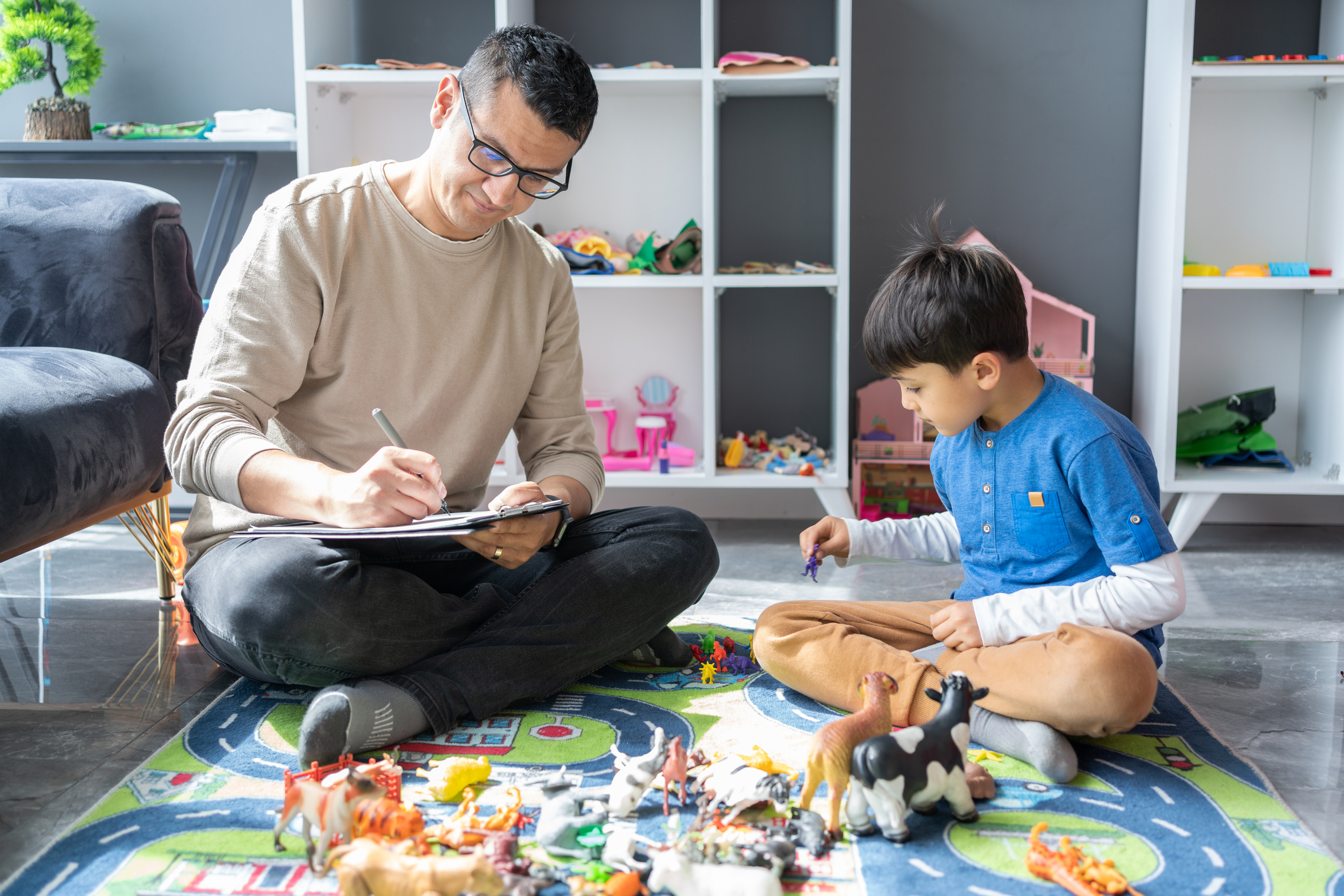
30 Oct The Benefits of Play Therapy for Children: Exploring Emotions and Developing Coping Skills
In a world where children are constantly navigating new experiences and emotions, assisting them in developing healthy coping skills is a must. Play therapy has emerged as an effective method for children to explore their emotions and build resilience.
What is Play Therapy?
Play therapy is a form of counseling or psychotherapy that uses play to communicate with and help children. It leverages the natural way that children learn about themselves and their relationships in the world. Through play, children can express their feelings, process experiences and resolve conflicts.
Origins and History
The roots of play therapy can be traced back to the early 20th century. Psychologists like Sigmund Freud and Carl Jung observed that children often expressed their emotions through play. Virginia Axline, a pioneer in the field, developed non-directive play therapy, emphasizing that children have the inner drive to heal themselves with the right environment and support.
How Does it Work?
In a typical session, the therapist provides a variety of play materials and lets the child choose how to use them. This could include toys, art supplies and games. The therapist observes the child’s play and may engage with them, helping the child to express emotions and thoughts that they might not be able to verbalize.
Emotional Exploration Through Play
- Safe Space for Expression
One of the most significant advantages of play therapy is that it provides a safe space for children to express their feelings. Unlike adults, children may not have the vocabulary to describe their emotions. Through play, they can act out scenarios and show how they feel inside, without the fear of judgment.
- Understanding Complex Feelings
Children often experience complex emotions that they can’t fully understand or articulate. Play therapy allows them to explore these feelings in a manageable way. For example, a child dealing with anger might use a toy to represent their feelings, helping them to externalize and then understand and manage their anger.
- Building Emotional Vocabulary
Through interactions with the therapist, children begin to build an emotional vocabulary. They learn to identify and label their feelings, which is a crucial step toward emotional intelligence. This newfound vocabulary helps them communicate more effectively with their peers and caregivers.
Developing Coping Skills
- Problem-Solving Abilities
Play therapy encourages children to think creatively and develop problem-solving skills. Through guided play, children learn to approach problems from different angles and find solutions. This skill is invaluable, as it translates to real-life situations where they can apply these problem-solving techniques.
- Stress Management
Life can be stressful for children too. Whether it’s school pressures or changes at home, stress is a common part of growing up. Play therapy introduces children to various coping mechanisms, such as deep breathing or creating art, which they can use to manage stress in their daily lives.
- Resilience Building
Resilience is the ability to bounce back from setbacks. Play therapy fosters resilience by teaching children how to cope with difficulties and view challenges as opportunities for growth. Through repeated practice in a supportive environment, children develop a growth mindset that will serve them throughout their lives.
Social Skills and Play Therapy
- Improving Communication
Effective communication is a vital social skill. In play therapy, children practice both verbal and non-verbal communication. They learn how to express their needs and listen to others, which improves their interactions with peers and adults alike.
- Empathy Development
Empathy is the ability to understand and share the feelings of another. Through role-playing and interactive games, children in play therapy learn to see things from different perspectives. This heightened sense of empathy helps them build stronger, more compassionate relationships.
- Conflict Resolution
Conflicts are inevitable, and learning how to resolve them peacefully is vital to a child’s well-being. Play therapy provides a controlled environment where children can practice conflict resolution. They learn to negotiate, compromise and find mutually acceptable solutions, skills that are essential for healthy social interactions.
The Role of Parents in Play Therapy
- Active Participation
While the therapist plays a central role, parents are also important participants in the play therapy process. Therapists often involve parents by providing updates and suggesting activities to do at home that reinforce the skills learned in therapy.
- Supporting at Home
Caregivers can support their child’s progress by creating a nurturing environment at home. Simple activities like playing together, reading stories or engaging in creative arts can reinforce the therapeutic benefits and strengthen the parent-child bond.
Evidence-Based Benefits
- Research and Studies
Numerous studies have demonstrated the effectiveness of play therapy. Research shows that play therapy can significantly reduce symptoms of anxiety, depression and behavioral issues in children. It has also been found to improve social skills and academic performance.
Choosing the Right Play Therapist
- Qualifications and Credentials
When selecting a play therapist, do your research and check qualifications and credentials. Look for a therapist who is certified by recognized bodies like the Association for Play Therapy. This ensures they have the necessary training and expertise to provide effective therapy. Experienced therapists are more likely to have the skills and insights needed to address your child’s unique needs.
- Comfort and Compatibility
Your child needs to feel comfortable with the therapist. A good rapport between the child and therapist is a must for successful therapy. Don’t hesitate to meet with potential therapists first to find the best fit for your child.
Integrating Play Therapy into Daily Life
- Routine Playtime
Incorporating routine playtime into your child’s daily schedule can extend the benefits of play therapy. Set aside time each day for unstructured, creative play. This not only reinforces the skills learned in therapy but also provides a healthy outlet for your child’s emotions and creativity.
- Mindful Play
Encourage mindful play by focusing on the present moment and fully engaging in activities. Whether it’s building with blocks, drawing or playing a board game, being present with your child during playtime strengthens your bond and creates a supportive environment for emotional expression.
- Creative Activities
Incorporate a variety of creative activities into your child’s routine. Activities like painting, storytelling and music can provide additional outlets for emotional exploration and self-expression. These activities complement play therapy and foster a well-rounded approach to emotional development.
Contact Psych Choices Today
If you are a parent or guardian in the Delaware Valley, Psych Choices in Broomall, PA provides child therapy, counseling and more. Our experienced therapists can offer a variety of techniques, including play therapy, to help your child manage their emotions and communicate successfully. We also offer parenting techniques and ideas to help parents deal with their child’s behavior challenges. Contact us today to schedule a consultation and learn more about how we can help you and your child.




Sorry, the comment form is closed at this time.